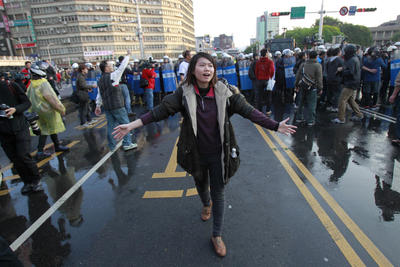One day earlier, on 17 March, the ruling Kuomintang party (KMT) said an initial review of a service trade pact with mainland China was complete, skipping directly to a final review in parliament on 8 April. The opposition Democratic Progressive Party (DPP) has opposed any moves that it alleges increase Taiwanese economic vulnerability to Beijing’s influence, but lacks the numbers to block its final passage in parliament. Opposition legislators reacted with a hunger strike, and Taiwanese students responded by mobilising through social media against the ruling KMT’s ‘illegal hastening’ of the trade pact.
During an evening rally outside the government offices, popular discontent with this democratic leapfrogging spread into action as several hundred protestors stormed into and barricaded themselves inside of the Legislative Yuan. Countless YouTube videos and live streams showed the students blocking entrances with chairs and raising banners reading ‘refuse to allow the trade pact to clear the legislative floor’. Police have so far failed to remove the protestors. Student leaders have continued to occupy the podium, even expanding their protests into the Executive Yuan. So what does this mean for Taiwan’s burgeoning democracy?
First, the Taiwanese students are clearly willing to hold their government to account. When the KMT cut short the bipartisan review of the trade agreement on 17 March, democratic processes were skirted, if not altogether ignored. Student protesters in the Legislative Yuan are exercising a democratic right in demanding an item-by-item review of the agreement that was promised. Taiwanese remain cautious of becoming too easily manipulated by Beijing. Opposition parties and civil society groups — including the DPP and Taiwan Solidarity Union (TSU) — argue that the trade agreement would not only allow China to influence Taiwan’s governing system, but that the economic stipulations would benefit big corporations to the detriment of local Taiwanese enterprises. The current ‘occupy’ movement is thus a chance for some Taiwanese to raise these concerns and to apply brakes to Taipei’s relationship with Beijing, thereby giving the opposition time to propose a ‘better agreement’ than the current trade pact.
Second, public opposition to President Ma Ying-jeou is likely to continue. With an approval rating of 9.2 per cent, the lowest since his inauguration, broad discontent is likely to continue after President Ma’s under-the-table hustling of the trade agreement with China. Not allowing full review of the trade agreement has simply fuelled public perceptions that core KMT leaders are sacrificing Taiwanese interests to strengthen ties with mainland China. In the longer term, this could impact the 2016 presidential elections. Taiwanese voters may become increasingly wary of any future KMT policy initiatives toward mainland China, shifting votes in favour of the opposition. Beijing will be anything but pleased if the recent thaw in cross-strait relations ends abruptly under DPP leadership.
Third, the implications of these protests for cross-strait relations should not be underestimated. Not only will the Taiwanese be sceptical of top Taiwanese leadership negotiating on the island’s behalf vis-à-vis Beijing, but the island will be in no rush to reach subsequent agreements with mainland China. The current occupation movement is evidence that a portion of the Taiwanese public feels burned by their government. It is one thing to have the parliamentary approval process expedited; but when the agreement is not given a full review, potentially leaving the island susceptible to future political or economic influence from Beijing, it is hardly surprising that protests have erupted. Few are ready or willing to see Taiwan become the next Hong Kong.
The Taiwanese know well the challenges of democracy building. These protests will be another learning experience for Taiwan, albeit one with unavoidable consequences for relations with mainland China.
Lauren Dickey is a Research Associate in US Foreign Policy at the Council on Foreign Relations.

